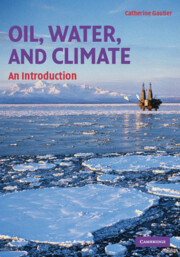Book contents
- Frontmatter
- Contents
- Foreword
- Introduction
- 1 Overview
- 2 Carbon Dioxide Emissions, Global Warming, and Water Resources
- 3 Population, Environmental Impacts, and Climate Change
- 4 Carbon Cycle and the Human Impact
- 5 Peak Oil, Energy, Water, and Climate
- 6 Oil Consumption and CO2 Emissions from Transportation
- 7 Oil, Economy, Power, and Conflicts
- 8 Energy Alternatives and Their Connection to Water and Climate
- 9 The Water Cycle and Global Warming
- 10 Fresh Water Availability, Sanitation Deficit, and Water Usage: Connection to Energy and Global Warming
- 11 Rivers, Lakes, Aquifers, and Dams: Relation to Energy and Climate
- 12 Water Contamination, Energy, and Climate
- 13 Geopolitics of Water and the International Situation
- 14 Water Alternatives
- 15 Global Climate Change: Observations, Modeling, and Predictions
- 16 Energy and Water Challenges and Solutions in a Changing Climate Framework: Commonality, Differences, and Connections
- References
- Index
7 - Oil, Economy, Power, and Conflicts
Published online by Cambridge University Press: 05 September 2012
- Frontmatter
- Contents
- Foreword
- Introduction
- 1 Overview
- 2 Carbon Dioxide Emissions, Global Warming, and Water Resources
- 3 Population, Environmental Impacts, and Climate Change
- 4 Carbon Cycle and the Human Impact
- 5 Peak Oil, Energy, Water, and Climate
- 6 Oil Consumption and CO2 Emissions from Transportation
- 7 Oil, Economy, Power, and Conflicts
- 8 Energy Alternatives and Their Connection to Water and Climate
- 9 The Water Cycle and Global Warming
- 10 Fresh Water Availability, Sanitation Deficit, and Water Usage: Connection to Energy and Global Warming
- 11 Rivers, Lakes, Aquifers, and Dams: Relation to Energy and Climate
- 12 Water Contamination, Energy, and Climate
- 13 Geopolitics of Water and the International Situation
- 14 Water Alternatives
- 15 Global Climate Change: Observations, Modeling, and Predictions
- 16 Energy and Water Challenges and Solutions in a Changing Climate Framework: Commonality, Differences, and Connections
- References
- Index
Summary
A future oil scarcity may lead to global conflict, and the differential access to energy creates a widening gap between rich and poor that could even be exacerbated by climate change in the future. In general, a lack of access to oil and energy has been found to breed poverty, and poverty, in turn, might breed terrorism. Climate plays a role in the level of present oil prices, and this role is expected to increase in the future.
Introduction
Oil may accurately be called the lifeblood of many nations' economies. In the United States, oil is so enmeshed in all aspects of daily life that its role in the U.S. economy is now critical. Although most consumers do not realize how dependent they are on this finite resource, global markets and savvy geopolitical players are very aware that oil is one of the most desired resources on Earth. The need to secure oil supplies often deeply affects the geopolitics and economics of both developed and developing nations and has already been the cause of conflicts. From its role in everyday life to its part in fear-inflicting terrorist attacks, the aura of oil can be perceived around the globe. What cannot be seen as easily, however, are the effects that changing climate can have on this web of oil dependency in which billions of people have found themselves caught.
- Type
- Chapter
- Information
- Oil, Water, and ClimateAn Introduction, pp. 123 - 137Publisher: Cambridge University PressPrint publication year: 2008



